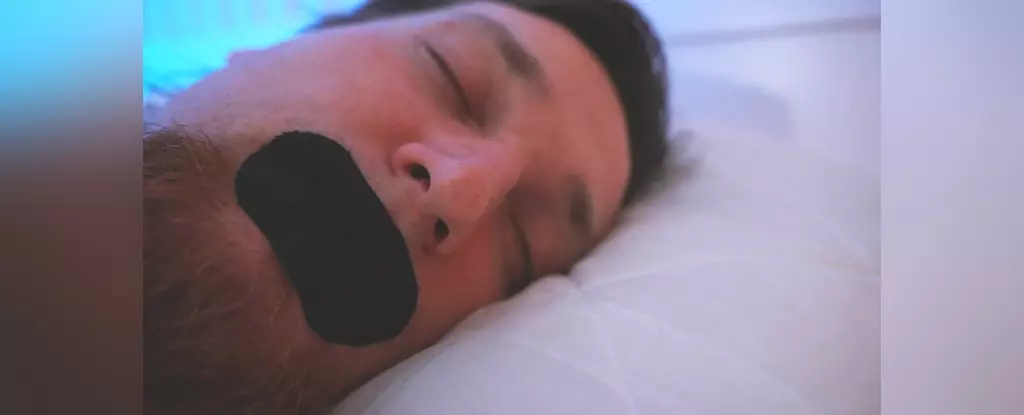The phenomenon of mouth taping has gained traction on social media, particularly through platforms like TikTok, where influencers boast about its myriad benefits. From improved jawline definition to enhanced energy levels and better oral hygiene, mouth taping has become heralded as a miracle cure for various woes, especially those related to sleep. This enthusiasm is perhaps a testament to society’s persistent search for quick fixes in an era where instant solutions are just a video away. However, while the allure of a simple solution to complex problems is tempting, it’s critical to examine the implications and potential risks that accompany such practices.
The Science Behind Mouth Breathing and Sleep Disorders
Mouth breathing during sleep can be symptomatic of deeper issues, such as obstructive sleep apnea (OSA), nasal blockages, or other respiratory conditions. While anecdotal evidence online suggests that taping the mouth shut can help mitigate these issues, actual scientific investigations present a different narrative. Most studies focusing on this phenomenon have been conducted under stringent clinical conditions, including sleep studies that monitor various physiological parameters to assess the effectiveness of mouth taping.
Indeed, some research has reported slight improvements in mild cases of obstructive sleep apnea. These findings, however, should not overshadow the significant portion of research that concludes the technique lacks robust evidence to endorse its widespread use. In instances where nasal obstructions are present—due to factors like sinuses, structural abnormalities, or other medical issues—simply applying tape to the mouth does not address the root causes. Instead, it may lead anxious individuals and their partners down a misguided path, delaying necessary treatments that could alleviate their suffering.
The Risks of Self-Diagnosis
A critical issue with mouth taping is the tendency for individuals to self-diagnose based on trends rather than seeking professional medical advice. The data reveals a concerning reality: patients may opt for mouth taping as a DIY remedy without fully comprehending the underlying conditions affecting their sleep quality. For those with nasal obstructions or more severe forms of sleep apnea, the practice could even introduce dangerous consequences such as asphyxiation. Ignoring the medical advice in favor of viral trends can lead to catastrophic outcomes, undermining a person’s health while safeguarding against legitimate medical evaluation.
A Lack of Quality Evidence
A glaring red flag in the research concerning mouth taping is the poor quality of existing studies. A recent review identified that all ten significant studies examined were flawed by various factors, including limited follow-up with test subjects, non-representative sample populations, and inadequate adjustments for confounding variables that could mislead results. When the foundation of research lacks solidity, the conclusions drawn can lead to dangerous misunderstandings regarding the efficacy of practices like mouth taping.
For any serious sleep disorder, investing time in trustworthy medical evaluation is critical. Quality evidence is the bedrock of effective treatment decisions, and hastily accepting social media claims can potentially place a person’s health in jeopardy.
Rethink the Quick Fix
While the internet often promotes quick and easy solutions, it’s essential to remain wary of quick-fix approaches, particularly concerning health. Mouth taping might appear to be an innocuous, straightforward strategy, but it conflates symptom management with actual cause resolution. It is paramount to seek professional opinions to explore comprehensive assessments and targeted therapies that address the root of sleep issues.
In a society driven by immediacy, it’s vital to remember that true health and well-being often come from sustained effort and informed choices, not merely from following the latest trending advice. Rather than succumbing to viral suggestions, investing time in medical consultations can pave the way for healthier sleeping habits and improved life quality down the line.


Leave a Reply